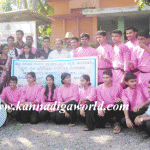
The personnel of Central Industrial Security Force, who reside at Central Government Society in Antop Hill, were affected over the past 1 month; colony also houses officials of CBI, excise & customs
Residents of the Central Government Society (CGS) are a worried lot. Scores of people living in the colony have contracted dengue in the past one month, and the Central Public Works Department (CPWD) have done naught to alleviate their fears or clean up the place.
The colony, at Antop Hill, houses central government employees from departments such as Central Excise, Customs, Central Industrial Security Force (CISF) and Central Bureau of Investigation (CBI). And while nearly 50 personnel from CISF have been affected by dengue in the past month, cases of the others contracting the disease have also been reported.
“This is of grave concern as the number of people affected by dengue has gone up in the past month,” said a society resident. There is an open drain behind the colony, along with the Dharavi slums and some under-construction buildings nearby.
Another resident said, “We have written numerous letters to the CPWD, as they are in charge of this area, but there has been no reply from them. We wrote a letter last month informing them that there is garbage lying all around our society, along with an open sewer line. We told them this is affecting our health and they need to take immediate action. But our complaints have fallen on deaf ears.”
Most of the patients are rushed to Micro Care Diagnostic and Health Centre, which is located within the premises of CGS in Sector 7. Mukesh Bhanushali, a senior doctor at the facility, explained, “We have had 5-6 cases of dengue per week from the society. A patient, once admitted, is discharged only after 3-4 days, after which he needs a clean environment, rest and a proper diet in order to recover completely.”
Hemendra Singh, public relations officer of CISF, told mid-day, “We have maintained cleanliness inside the compound, but there is an open drainage line right outside the society along with slums. These need to be taken care of by the local bodies and the CPWD. We have written several letters to CPWD but to no avail.” Nearly 1,000 CISF families reside in this colony.
BMC speak
Trushna Vishwasrao, leader of the BMC house and corporator of this area, said, “The CGS quarters partly fall in my area and I have taken stock of the situation from the health officer of F-North ward. He said there were five mosquito breeding sites. Some dengue cases were also reported from these quarters.
The problem is that these houses have water leakage and this water gets accumulated, giving rise to mosquitoes. Since the apartments don’t fall under the purview of the BMC, we cannot look into the repairs. However, as a precaution, fogging is conducted at regular intervals. We will also carry out a clean-up soon in this area.”
Alka Sasane, assistant municipal commissioner of F-North ward, said, “CGS quarters come under the Central government, hence we do not look after repairs there. However, since it is a health-related issue, we are fogging the area. Notices have been sent to the construction sites where breeding was found and not to the residential areas, since the latter are not under our jurisdiction.”
PWD speak
M K Rathod, senior engineer who is partly in charge of Sector 7 of CGS quarters, said, “We clean the gutters and maintain cleanliness part by part. Since the colony is so huge, cleaning the same area takes at
least 3-4 days.” Venkath Narsaiah, executive engineer, CPWD, said, “I have recently joined and need to check the facts. We will, however, ensure that inconvenience is not caused to the residents.”


